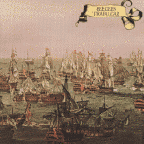![]()
  |

Trafalgar
Bee Gees
Atco 7003
Released: September 1971
Chart Peak: #34
Weeks Charted: 14


 One of AM radio's most consistent hit single groups is back together again. Before their auspicious break-up two years ago, the Bee Gees produced some fine music -- recall "Holiday," "Words," or "Massachusetts," their three most perfunctorily titled and musically exciting records. Their tremulous vocals, vivid lyrics and brilliant arrangements of strings, horns, guitars and piano/organ, are heard again on their current AM hit, "How Can You Mend A Broken Heart," included on Trafalgar.
One of AM radio's most consistent hit single groups is back together again. Before their auspicious break-up two years ago, the Bee Gees produced some fine music -- recall "Holiday," "Words," or "Massachusetts," their three most perfunctorily titled and musically exciting records. Their tremulous vocals, vivid lyrics and brilliant arrangements of strings, horns, guitars and piano/organ, are heard again on their current AM hit, "How Can You Mend A Broken Heart," included on Trafalgar.
None of their earlier seductive, encircling harmony is gone and the arrangement, from the opening melodic piano intro to the closing blend of guitars, is letter-perfect. Add to this the lyrics, that wander from questioning title to statement ("No one said a word about the sorrow..."), to a questioning chorus and plea ("Please help me mend my broken heart and let me live again...") and the result is a four-minute minor masterpiece. Like some of their earlier first-person musical forays, such as "I Started A Joke" and "I've Gotta Get A Message To You," it induces you to turn the volume up whenever it is played: the worldwide trademark of a good single.
Unlike the run-of-the-mill AM radio success stories, however, the Bee Gees have always come up with albums that, tune for tune, match their AM hits. This album is no exception -- virtually every cut has all the stylistic and fully-maturized singles potential as "How Can You Mend." From the elliptical "Israel" and "Trafalgar" (that possesses the same quasi-historical profundity as their earlier "New York Mining Disaster 1941") to the lush love tunes "Dearest" and "The Greatest Man In the World" to the melancholy "Somebody Stop the Music" and "Don't Wanna Live Inside Myself," the range is as wide as the versatile Gibbs brothers' songwriting abilities. Every tune, save one, on this album is well over the three-minute length -- and all display a melodic depth which is apt to surprise the skeptical.
The mood builds frenetically after the first chorus, until, by the song's close, all three Gibbs are trading, screaming verses and parts of verses back and forth. And yet nothing is overdone. The Bee Gees and their producer, Robert Stigwood, have an unerring concept of where the musical brink of every song is and of how far they can stretch it, before they rein things in. Even the most tranquil of the album's tunes, "Dearest," which has all three Gibbs alternating the lyrics, each with a different modulation, betrays a vibrant sense of lyrical restraint that is totally unheralded in pop music -- except for, of course, their earlier epic "Words."
The Bee Gees are masters of the ballad form. I only hope they stick together now for many years to come -- AM radio needs their periodic transfusions and resultant albums of this quality are faultless. If you're in doubt as to whether to purchase the single or the album -- opt for the latter.
- Gary Von Tersch, Rolling Stone, 10/28/71.
Bonus Reviews!
Trafalgar's "How Can You Mend A Broken Heart?" was the Bee Gee's first number one single. Despite this chart success, this record doesn't rate as highly as some of their other albums of this period due to somewhat lackluster material. * * *
- Jim Worbois, The All-Music Guide to Rock, 1995.
The Bee Gees had spent some years in the wilderness before Trafalgar, but the quality of the album more than made up for the wait. Recorded between January and April 1971, it revealed the Brothers Gibb truly working together in harmony again.
A few things had changed in the re-formed band. They were now much more pedantic about their songwriting credits, and Robin -- having proved himself during the two-year split with the magnificent Robin's Reign -- exercised his right to do nothing but sing, so half the album does not feature him at all.
Bad news first: "Don't Wanna Live Inside Myself" pays too much homage to "While My Guitar Gently Weeps," while Robin's funeral Edwardian parlor song "Dearest" is horrendous. But the rest is pure lush pop brilliance. Maurice's two solo compositions show him finally coming out as a truly great songwriter. "Lion in Winter" is infectiously experimental -- much of it is just drums, and the rhythm expands epically at the end. The usual bizarrely maudlin lyrics are in evidence in spades: "Now I feel as good as if I were dead" is a gem, but "Somebody crown the clown with the red balloon" takes the trophy. And the hits kept coming, "How Can You Mend A Broken Heart" providing a U.S. No. 1.
The cover was the usual early 1970s Bee Gees strangeness, the group enacting the death of Nelson in the gatefold, new member Geoff Bridgeford reading a Beezer comic. The lads' dad, Hugh, is in the picture because, apparently, he was "just there."
- David Nichols, 1001 Albums You Must Hear Before You Die, 2005.
![]() Reader's Comments
Reader's Comments
No comments so far, be the first to comment.